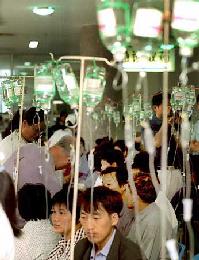Reuters: China Holds Restaurant Boss After Mass Poisoning
Sun Sep 15, 2002
(Clearwisdom.net)
TANGSHAN, China (Reuters) - Chinese authorities held the boss of a fast food restaurant for questioning on Sunday as they investigated a food poisoning outbreak that state media said had killed 41 people and put hundreds more in hospital.
Locals in Tangshan, a small industrial town near the eastern city of Nanjing, estimated that more than 100 people had died after eating breakfast snacks including sesame cakes and fried dough sticks at a branch of the Heshengyuan Soy Milk chain.
The Communist Party's Central Committee and the cabinet sent a team of police and health officials to investigate the case, state media said, highlighting concerns in Beijing about bad publicity in the sensitive run-up to a leadership change.
Peng Yongqing, who owns a store next to the tiny Heshengyuan outlet -- now closed -- on the main thoroughfare through Tangshan, said he saw one elderly man collapse after eating breakfast there Saturday.
"It happened right there in front of my store," he told Reuters. "One minute he was sitting there eating and the next he stood up and keeled over. We all thought he was choking, we had no idea what was wrong."
The man died on the way to hospital, said Peng.
As a motorcade carrying plainclothes and uniformed police sped around the normally quiet town of a few thousand people, rumors about the poisoning swirled, with some saying they suspected foul play.
Others said they saw victims bleeding at the mouth and ears.
The official Xinhua news agency said on its Web site on Saturday 400 people, many of them construction workers and school children, were poisoned and 41 had died. It quoted doctors saying the death toll was likely to rise.
But it later reverted to an earlier story, saying only that "a number of victims" had died and more than 200 were poisoned.
State television showed footage of ambulances and military vehicles rushing to hospitals where some victims were treated in waiting rooms and corridors.
LOCALS SUSPECT FOUL PLAY
Locals said they saw scores of ambulances taking several hundred people to hospital, adding that far more than 41 were dead. The sick had been transferred to hospitals in Nanjing, some 50 km (30 miles) away, they said.
A woman who declined to be identified said snacks from Heshengyuan, renowned for being tasty and cheap, were also sold in her village a few miles away where at least 10 people had been poisoned and two people had died.
A Nanjing government official said the manager of Heshengyuan was "under police control" until investigators had established the cause of the outbreak.
Tangshan residents said the source of the poisoning was more likely to be a stall in an alley opposite which made the breakfast snacks and delivered them to Heshengyuan each morning.
Police cordoned off the dark and grimy alley and a police motorcade was seen pulling up to inspect it Sunday afternoon.
Police, health ministry officials and local hospitals all declined comment.
Food poisoning deaths have sometimes occurred in China from restaurants using cheaper industrial salts instead of supermarket salt. Food poisoning killed 146 people and affected more than 15,000 others last year in China, many caused by rat poison, chemicals and bacteria, state media have said.
There was no explanation for the change on the Xinhua Web site, but state media are often subject to strict controls on coverage of disasters and other sensitive stories.
Censors have tightened restrictions in the run-up to a five-yearly Communist Party congress in November when party chief Jiang Zemin and other leaders are expected to retire.
On the Web site of the People's Daily, the Communist Party mouthpiece, some readers expressed their frustration on a bulletin board.
"So many people are dead, but the TV channels are all putting on a show of happiness. Do the news people have no sense of responsibility or pity or are they not allowed?" said one.
"The Nanjing case shows the quality of the people is first rate, but the quality of leaders is lacking," said another.
